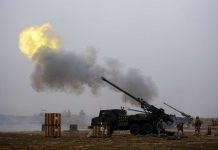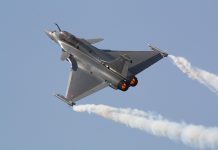
Denmark is set to become the first NATO member to host Ukrainian weapons manufacturing on its soil. Starting in December, Fire Point—the Ukrainian developer of the Flamingo long-range cruise missile—will begin producing solid rocket fuel at a site near Skrydstrup Air Base in South Jutland, home to Denmark’s fleet of F-16 fighters.
The Danish Ministry of Defence confirmed the plan on Wednesday, describing it as part of Copenhagen’s wider support for Ukraine’s sovereignty and security. “This contributes to Ukraine’s fight for safety, independence, and the right to peace,” Defense Minister Troels Lund Poulsen said.
This marks the first time a Ukrainian defense company has expanded operations abroad. The move follows an agreement signed in June during the NATO summit, which gave Ukrainian firms the green light to open facilities in Denmark. To speed up the initiative, the Danish government has allocated 500 million crowns ($77.8 million).
The Flamingo missile—hailed by President Volodymyr Zelenskyy as Ukraine’s “most successful weapon”—carries a one-ton warhead, reaches speeds of up to 950 km/h, and can strike targets as far as 3,000 kilometers away. Production began in late 2024, with reports that the system has already been deployed against Russian positions in Crimea.
Still, Fire Point’s expansion comes under a cloud of scrutiny at home. Ukraine’s National Anti-Corruption Bureau (NABU) is currently investigating the company over alleged irregularities in government drone procurement deals, including claims of inflated costs and overstated quantities.
Denmark has consistently ranked among Ukraine’s strongest allies, committing 67.6 billion crowns ($10.13 billion) in military support since 2022. Hosting weapons manufacturing so close to a key air base, however, raises new security considerations for Copenhagen and NATO.
Solid rocket fuel offers operational benefits over liquid propellants—it does not require fueling immediately before launch and is easier to transport and store. But producing it involves handling dangerous chemicals and demands highly secure, specialized facilities.
By building abroad, Ukraine hopes to protect its defense sector from Russian strikes while also tapping into Western technology and supply chains. Zelenskyy has already revealed that Kyiv is negotiating similar co-production deals with Denmark, Norway, Germany, Canada, the U.K., and Lithuania. Germany, Ukraine’s largest supporter after the United States, has also pledged to strengthen defense industry cooperation.
The new plant in Denmark is scheduled to open on December 1.




